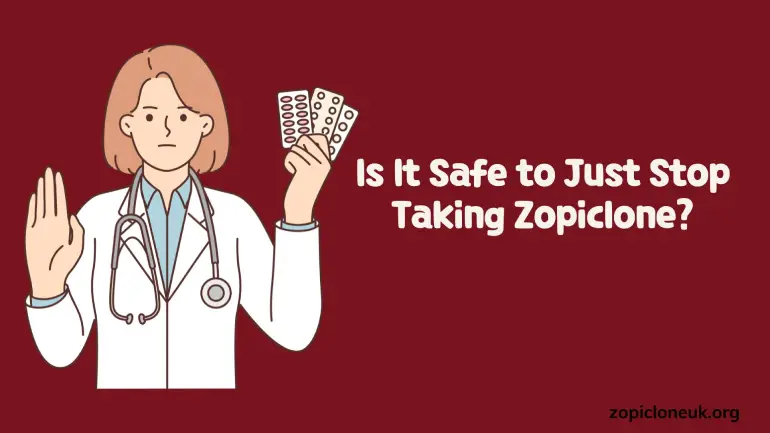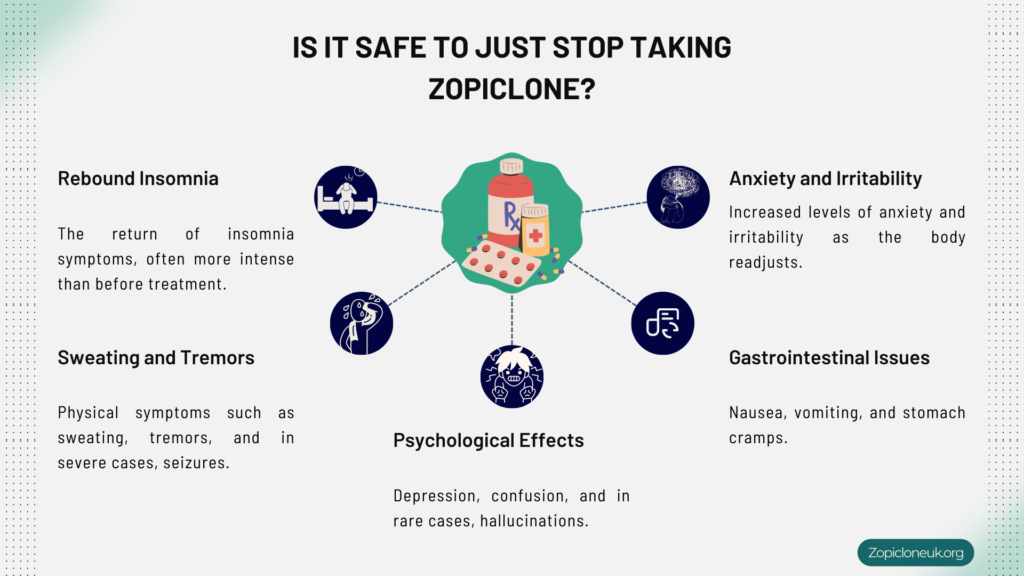
Is It Safe to Stop Taking Zopiclone:- Zopiclone is a non-benzodiazepine hypnotic agent commonly prescribed for the short-term treatment of insomnia. It works by modulating benzodiazepine receptors, aiding in quicker sleep onset and longer sleep duration. As with any medication, especially those affecting the central nervous system, it is crucial to understand the potential risks associated with discontinuing its use abruptly.
Contents
Understanding Zopiclone
Zopiclone, sold under brand names like Imovane and Zimovane, is used primarily for treating severe insomnia in adults. Its short-term efficacy makes it a popular choice, but its usage needs to be carefully monitored due to the potential for dependence and withdrawal symptoms.
Risks of Abruptly Stopping Zopiclone
Stopping zopiclone suddenly can lead to several withdrawal symptoms, some of which can be severe. These symptoms may include:

- Rebound Insomnia: The return of insomnia symptoms, often more intense than before treatment.
- Anxiety and Irritability: Increased levels of anxiety and irritability as the body readjusts.
- Sweating and Tremors: Physical symptoms such as sweating, tremors, and in severe cases, seizures.
- Gastrointestinal Issues: Nausea, vomiting, and stomach cramps.
- Psychological Effects: Depression, confusion, and in rare cases, hallucinations.
Gradual Discontinuation: A Safer Approach
To minimize withdrawal symptoms and potential health risks, it is recommended to taper off zopiclone under medical supervision. Gradual dose reduction allows the body to adjust slowly, reducing the severity of withdrawal symptoms.
- Consult Your Doctor: Before making any changes to your medication regimen, consult your healthcare provider. They can provide a tapering schedule tailored to your needs.
- Follow a Tapering Plan: Your doctor may suggest gradually lowering your dose over several weeks or months, depending on your usage duration and dosage.
- Monitor Symptoms: Keep track of any withdrawal symptoms and report them to your doctor. Adjustments to the tapering schedule may be necessary.
Managing Withdrawal Symptoms
While tapering off zopiclone, it’s essential to employ strategies to manage withdrawal symptoms effectively:
- Healthy Sleep Hygiene: Maintain a consistent sleep schedule, create a restful environment, and avoid stimulants like caffeine close to bedtime.
- Relaxation Techniques: Practices such as deep breathing, meditation, and yoga can help reduce anxiety and promote relaxation.
- Physical Activity: Regular exercise can improve sleep quality and overall well-being.
- Support System: Lean on friends, family, or support groups for emotional support during this period.
Long-Term Management of Insomnia
For those struggling with chronic insomnia, long-term solutions beyond medication should be considered:
- Cognitive Behavioral Therapy for Insomnia (CBT-I): This is a structured program that helps you identify and replace thoughts and behaviors that cause or worsen sleep problems.
- Lifestyle Changes: Adopting a healthy lifestyle, including a balanced diet and regular exercise, can significantly impact sleep quality.
- Alternative Therapies: Acupuncture, aromatherapy, and other holistic approaches may also be beneficial.
FAQ
Q1: What happens if I stop taking zopiclone suddenly?
A1: Abruptly stopping zopiclone can lead to withdrawal symptoms such as rebound insomnia, anxiety, irritability, sweating, tremors, gastrointestinal issues, and psychological effects.
Q2: How should I discontinue zopiclone safely?
A2: It is recommended to taper off zopiclone gradually under medical supervision. Consult your doctor for a personalized tapering plan.
Q3: How long does zopiclone withdrawal last?
A3: The duration of withdrawal symptoms can vary depending on the individual and their dosage. Symptoms may last for a few days to several weeks.
Q4: Can I manage insomnia without medication?
A4: Yes, long-term solutions such as cognitive behavioral therapy for insomnia (CBT-I), healthy sleep hygiene, lifestyle changes, and alternative therapies can help manage insomnia effectively.
Q5: Are there any risks associated with long-term use of zopiclone?
A5: Long-term use of zopiclone can lead to dependence, tolerance, and increased risk of withdrawal symptoms. It is intended for short-term use, and long-term solutions should be considered for managing insomnia.
Conclusion
Abruptly stopping zopiclone can lead to significant withdrawal symptoms and health risks. The safest approach is to taper off the medication gradually under the supervision of a healthcare provider. Incorporating healthy sleep habits and considering long-term solutions for insomnia can provide sustainable results without relying on medication. Always consult your doctor before making any changes to your medication regimen to ensure a safe and effective discontinuation process.
Author Details




Medical content by qualified psychiatrists
Our editorial policy

Zopiclone precautions Read our potential abuse notice

Looking for a seller? Locate the best Zopiclone vendor






